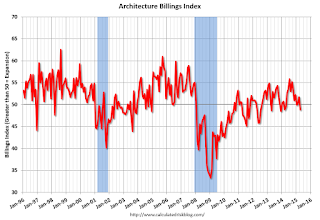From the AIA: Architecture Billings Remain Stuck in Winter Slowdown
Riding a stretch of increasing levels of demand for thirteen out of the last fifteen months, the Architecture Billings Index (ABI) dropped in April for the second month this year. As a leading economic indicator of construction activity, the ABI reflects the approximate nine to twelve month lead time between architecture billings and construction spending. The American Institute of Architects (AIA) reported the April ABI score was 48.8, down sharply from a mark of 51.7 in March. This score reflects a decrease in design services (any score above 50 indicates an increase in billings). The new projects inquiry index was 60.1, up from a reading of 58.2 the previous month.
“The fundamentals in the design and construction industry remain very healthy,” said AIA Chief Economist Kermit Baker, Hon. AIA, PhD. “The fact that both inquires for new projects and new design contracts continued to accelerate at a healthy pace in April points to strong underlying demand for design activity. However, April would typically be a month where these projects would be in full swing, but a severe winter in many parts of the Northeast and Midwest has apparently delayed progress on projects.”
emphasis added
 Click on graph for larger image.
Click on graph for larger image.This graph shows the Architecture Billings Index since 1996. The index was at 48.8 in April, down from 51.7 in March. Anything below 50 indicates contraction in demand for architects' services.
Note: This includes commercial and industrial facilities like hotels and office buildings, multi-family residential, as well as schools, hospitals and other institutions. The multi-family residential market was negative for the third consecutive month - and this might be indicating a slowdown for apartments - or at least less growth.
According to the AIA, there is an "approximate nine to twelve month lag time between architecture billings and construction spending" on non-residential construction. This index was mostly positive over the last year, suggesting an increase in CRE investment in 2015.
No comments:
Post a Comment